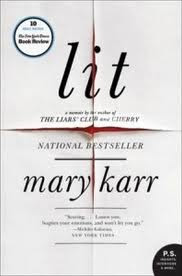
Mary Karr is apparently a famous memoirist. I am meeting her however only in this, her third book, so I have missed the Texas childhood with alcoholic parents, and the highly sexed adolescence, and am just tuning in for the descent into alcoholism.
It’s probably an indictment of my upbringing that I didn’t find this descent especially harrowing. Indeed, I barely found it alcoholism. For god’s sake, she doesn’t drink in the mornings! She doesn’t even get the shakes! However, this probably says more about Zimbabwean society than it does about the memoir. The important point is that she feels she is an alcoholic, and commits herself to AA and sobriety most commendably.
Her descent goes in parallel with the birth of her baby and the attendant collapse of her marriage. She desperately desires as baby, and – as seems to be the way with these things – is desperately unhappy once said baby arrives.
She writes with great honesty, and often a real comic sense, about this period:
The time I’m mostly thinking of, you were barely four, which – I would argue – is less like being a miniature person than like a dog or cat who can talk.
Her child is in fact a central character in this memoir. The lady has spent a lot of time in therapy, and thus there is a great deal about her parents’ failings, and how they explain everything about her life. I tried not to find this irritating. As a parent herself, she has, it seems to me, a vastly overinflated idea of how much impact she is having on her own child. At one point, she enrolls herself in therapy, because she snaps at her child – once! – in a grocery store parking lot. At other times, she seems to promote entirely bratty behaviour as charming self-expression:
As a toddler, once faced with a tea service at my in-laws’, he’d stuck his fist in the sugar bowl and upended it, sugar spraying all over as Mrs Whitbread hissed that no other child in that house had ever interfered with a tea.
While I struggled with some of Karr’s ideas, such as her understanding of your parents as the centre of your personality, I still very much enjoyed this book. It was bracingly, often painfully, honest. It is not often you get to hear someone’s in-depth analysis of their own failings, vanities, and embarrassing hangups; and I found her struggles with them, often unsuccessful, to be oddly inspirational.
